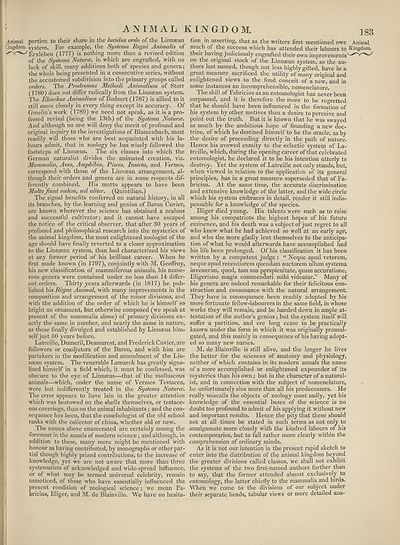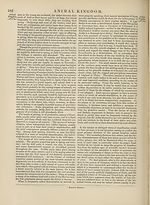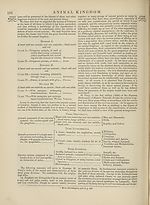Encyclopaedia Britannica > Volume 3, Anatomy-Astronomy
(191) Page 183
Download files
Complete book:
Individual page:
Thumbnail gallery: Grid view | List view

4
*
ANIMAL KINGDOM.
Animal portion to their share in the lucidus ordo of the Linnaean
kingdom, system. For example, the Systema Regni Animalis of
Erxleben (1777) is nothing more than a revised edition
of the Systema Naturae, in which are engrafted, with no
lack of skill, many additions both of species and genera;
the whole being presented in a consecutive series, without
the accustomed subdivision into the primary groups called
orders. The Prodromus 3Iethodi Animalium of Storr
(1780) does not differ radically from the Linnaean system.
The Elenchus Animalium of Bodaert (1787) is allied to it
still more closely in every thing except its accuracy. Of
Gmelin’s work (1789) we need not speak, as it is a pro¬
fessed revisal (being the 13th) of the Systema Naturae.
And although no one will deny the merit of profound and
original inquiry to the investigations of Blumenbach, most
readily will those who are best acquainted with his la¬
bours admit, that in zoology he has wisely followed the
footsteps of Linnaeus. The six classes into which the
German naturalist divides the animated creation, viz.
Mammalia, Aves, Amphibia, Pisces, Insecta, and Vermes,
correspond with those of the Linnaean arrangement, al¬
though their orders and genera are in some respects dif¬
ferently combined. His motto appears to have been
Multa fiunt eadem, sed aider. (Quintilian.)
The signal benefits conferred on natural history, in all
its branches, by the learning and genius of Baron Cuvier,
are known wherever the science has obtained a zealous
and successful cultivator; and it cannot have escaped
the notice of the critical observer, that after 30 years of
profound and philosophical research into the mysteries of
the animal kingdom, the most enlightened zoologist of the
age should have finally reverted to a closer approximation
to the Linnaean system, than had characterized his views
at any former period of his brilliant career. When he
first made known (in 1797), conjointly with M. Geoffrey,
his new classification of mammiferous animals, his nume¬
rous genera were contained under no less than 14 differ¬
ent orders. Thirty years afterwards (in 1817) he pub¬
lished his Regne Animal, with many improvements in the
composition and arrangement of the minor divisions, and
with the addition of the order of which he is himself so
bright an ornament, but otherwise composed (we speak at
present of the mammalia alone) of primary divisions ex¬
actly the same in number, and nearly the same in nature,
as those finally divulged and established by Linnaeus himr
self just 60 years before.
Latreille, Dumeril,Desmarest, and Frederick Cuvier, are
followers or coadjutors of the Baron, and with him are
partakers in the modification and amendment of the Lin¬
naean system. The venerable Lamarck has greatly signa¬
lized himself in a field which, it must be confessed, was
obscure to the eye of Linnaeus—that of the molluscous
animals—which, under the name of Vermes Testacea,
were but indifferently treated in the Systema Naturae.
The error appears to have lain in the greater attention
which was bestowed on the shells themselves, or testace¬
ous coverings, than on the animal inhabitants ; and the con¬
sequence has been, that the conchologist of the old school
ranks with the collector of china, whether old or new.
The names above enumerated are certainly among the
foremost in the annals of modern science; and although, in
addition to these, many more might be mentioned with
honour as having contributed, by monographs or other par-
183
tion in asserting, that as the writers first mentioned owe Animal
much of the success which has attended their labours to Kingdom,
their having judiciously engrafted their own improvements
on the original stock of the Linnaean system, so the au¬
thors last named, though not less highly gifted, have in a
great measure sacrificed the utility of many original and
enlightened views to the fond conceit of anew, and in
some instances an incomprehensible, nomenclature.
The skill of Fabricius as an entomologist has never been
surpassed, and it is therefore the more to be regretted
that he should have been influenced in the formation of
his system by other motives than a desire to perceive and
point out the truth. But it is known that he was swayed
as much by the ambitious hope of founding a new doc¬
trine, of which he destined himself to be the oracle, as by
the desire of proceeding directly in the path of nature.
Hence his avowed enmity to the eclectic system of La¬
treille, which, during the opening career of that celebrated
entomologist, he declared it to be his intention utterly to
destroy. Yet the system of Latreille not only stands, but,
when viewed in relation to the application of its general
principles, has in a great measure superseded that of Fa¬
bricius. At the same time, the accurate discrimination
and extensive knowledge of the latter, and the wide circle
which his system embraces in detail, render it still indis¬
pensable for a knowledge of the species.
Illiger died young. His talents were such as to raise
among his compatriots the highest hopes of his future
eminence, and his death was a subject of just regret to all
who knew what he had achieved so well at an early age,
and who the more gladly lent themselves to the anticipa¬
tion of what he would afterwards have accomplished had
his life been prolonged. Of his classification it has been
written by a competent judge : “ Neque apud veterem,
neque apud recentiorem quendam auctorem ullum systema
invenerim, quod, tam sua perspicuitate, quam accuratione,
Illigeriano magis commenclari mihi videatur.” Many of
his genera are indeed remarkable for their felicitous con¬
struction and consonance with the natural arrangement.
They have in consequence been readily adopted by his
more fortunate fellow-labourers in the same field, in whose
works they will remain, and be handed down in ample at¬
testation of the author’s genius; but the system itself will
suffer a partition, and ere long cease to be practically
known under the form in which it was originally promul¬
gated, and this mainly in consequence of his having adopt¬
ed so many new names.
M. de Blainville is still alive, and the longer he lives
the better for the sciences of anatomy and physiology,
neither of which contains in its modern annals the name
of a more accomplished or enlightened expounder of its
mysteries than his own; but in the character of a natural¬
ist, and in connection with the subject of nomenclature,
he unfortunately sins more than all his predecessors. He
really miscalls the objects of zoology most sadly, yet his
knowledge of the essential bases of the science is no
doubt too profound to admit of his applying it without new
and important results. Flence the pity that these should
not at all times be stated in such terms as not only to
amalgamate more closely with the kindred labours of his
contemporaries, but to fall rather more clearly within the
comprehension of ordinary minds.
As it is not our intention in the present rapid sketch to
tial though highly prized contributions, to the increase of enter into the distribution of the animal kingdom beyond
knowledge, yet we are not aware that more than three
systematists of acknowledged and wide-spread influence,
or of what may be termed universal celebrity, remain
unnoticed, of those who have essentially influenced the
present condition of zoological science ; we mean Fa¬
bricius, Illiger, and M. de Blainville. We have no hesita-
the greater divisions called classes, we shall not exhibit
the systems of the two first-named authors further than
to say, that the former attended almost exclusively to
entomology, the latter chiefly to the mammalia and birds.
When we come to the divisions of our subject under
their separate heads, tabular views or more detailed ana-
*
ANIMAL KINGDOM.
Animal portion to their share in the lucidus ordo of the Linnaean
kingdom, system. For example, the Systema Regni Animalis of
Erxleben (1777) is nothing more than a revised edition
of the Systema Naturae, in which are engrafted, with no
lack of skill, many additions both of species and genera;
the whole being presented in a consecutive series, without
the accustomed subdivision into the primary groups called
orders. The Prodromus 3Iethodi Animalium of Storr
(1780) does not differ radically from the Linnaean system.
The Elenchus Animalium of Bodaert (1787) is allied to it
still more closely in every thing except its accuracy. Of
Gmelin’s work (1789) we need not speak, as it is a pro¬
fessed revisal (being the 13th) of the Systema Naturae.
And although no one will deny the merit of profound and
original inquiry to the investigations of Blumenbach, most
readily will those who are best acquainted with his la¬
bours admit, that in zoology he has wisely followed the
footsteps of Linnaeus. The six classes into which the
German naturalist divides the animated creation, viz.
Mammalia, Aves, Amphibia, Pisces, Insecta, and Vermes,
correspond with those of the Linnaean arrangement, al¬
though their orders and genera are in some respects dif¬
ferently combined. His motto appears to have been
Multa fiunt eadem, sed aider. (Quintilian.)
The signal benefits conferred on natural history, in all
its branches, by the learning and genius of Baron Cuvier,
are known wherever the science has obtained a zealous
and successful cultivator; and it cannot have escaped
the notice of the critical observer, that after 30 years of
profound and philosophical research into the mysteries of
the animal kingdom, the most enlightened zoologist of the
age should have finally reverted to a closer approximation
to the Linnaean system, than had characterized his views
at any former period of his brilliant career. When he
first made known (in 1797), conjointly with M. Geoffrey,
his new classification of mammiferous animals, his nume¬
rous genera were contained under no less than 14 differ¬
ent orders. Thirty years afterwards (in 1817) he pub¬
lished his Regne Animal, with many improvements in the
composition and arrangement of the minor divisions, and
with the addition of the order of which he is himself so
bright an ornament, but otherwise composed (we speak at
present of the mammalia alone) of primary divisions ex¬
actly the same in number, and nearly the same in nature,
as those finally divulged and established by Linnaeus himr
self just 60 years before.
Latreille, Dumeril,Desmarest, and Frederick Cuvier, are
followers or coadjutors of the Baron, and with him are
partakers in the modification and amendment of the Lin¬
naean system. The venerable Lamarck has greatly signa¬
lized himself in a field which, it must be confessed, was
obscure to the eye of Linnaeus—that of the molluscous
animals—which, under the name of Vermes Testacea,
were but indifferently treated in the Systema Naturae.
The error appears to have lain in the greater attention
which was bestowed on the shells themselves, or testace¬
ous coverings, than on the animal inhabitants ; and the con¬
sequence has been, that the conchologist of the old school
ranks with the collector of china, whether old or new.
The names above enumerated are certainly among the
foremost in the annals of modern science; and although, in
addition to these, many more might be mentioned with
honour as having contributed, by monographs or other par-
183
tion in asserting, that as the writers first mentioned owe Animal
much of the success which has attended their labours to Kingdom,
their having judiciously engrafted their own improvements
on the original stock of the Linnaean system, so the au¬
thors last named, though not less highly gifted, have in a
great measure sacrificed the utility of many original and
enlightened views to the fond conceit of anew, and in
some instances an incomprehensible, nomenclature.
The skill of Fabricius as an entomologist has never been
surpassed, and it is therefore the more to be regretted
that he should have been influenced in the formation of
his system by other motives than a desire to perceive and
point out the truth. But it is known that he was swayed
as much by the ambitious hope of founding a new doc¬
trine, of which he destined himself to be the oracle, as by
the desire of proceeding directly in the path of nature.
Hence his avowed enmity to the eclectic system of La¬
treille, which, during the opening career of that celebrated
entomologist, he declared it to be his intention utterly to
destroy. Yet the system of Latreille not only stands, but,
when viewed in relation to the application of its general
principles, has in a great measure superseded that of Fa¬
bricius. At the same time, the accurate discrimination
and extensive knowledge of the latter, and the wide circle
which his system embraces in detail, render it still indis¬
pensable for a knowledge of the species.
Illiger died young. His talents were such as to raise
among his compatriots the highest hopes of his future
eminence, and his death was a subject of just regret to all
who knew what he had achieved so well at an early age,
and who the more gladly lent themselves to the anticipa¬
tion of what he would afterwards have accomplished had
his life been prolonged. Of his classification it has been
written by a competent judge : “ Neque apud veterem,
neque apud recentiorem quendam auctorem ullum systema
invenerim, quod, tam sua perspicuitate, quam accuratione,
Illigeriano magis commenclari mihi videatur.” Many of
his genera are indeed remarkable for their felicitous con¬
struction and consonance with the natural arrangement.
They have in consequence been readily adopted by his
more fortunate fellow-labourers in the same field, in whose
works they will remain, and be handed down in ample at¬
testation of the author’s genius; but the system itself will
suffer a partition, and ere long cease to be practically
known under the form in which it was originally promul¬
gated, and this mainly in consequence of his having adopt¬
ed so many new names.
M. de Blainville is still alive, and the longer he lives
the better for the sciences of anatomy and physiology,
neither of which contains in its modern annals the name
of a more accomplished or enlightened expounder of its
mysteries than his own; but in the character of a natural¬
ist, and in connection with the subject of nomenclature,
he unfortunately sins more than all his predecessors. He
really miscalls the objects of zoology most sadly, yet his
knowledge of the essential bases of the science is no
doubt too profound to admit of his applying it without new
and important results. Flence the pity that these should
not at all times be stated in such terms as not only to
amalgamate more closely with the kindred labours of his
contemporaries, but to fall rather more clearly within the
comprehension of ordinary minds.
As it is not our intention in the present rapid sketch to
tial though highly prized contributions, to the increase of enter into the distribution of the animal kingdom beyond
knowledge, yet we are not aware that more than three
systematists of acknowledged and wide-spread influence,
or of what may be termed universal celebrity, remain
unnoticed, of those who have essentially influenced the
present condition of zoological science ; we mean Fa¬
bricius, Illiger, and M. de Blainville. We have no hesita-
the greater divisions called classes, we shall not exhibit
the systems of the two first-named authors further than
to say, that the former attended almost exclusively to
entomology, the latter chiefly to the mammalia and birds.
When we come to the divisions of our subject under
their separate heads, tabular views or more detailed ana-
Set display mode to:
![]() Universal Viewer |
Universal Viewer | ![]() Mirador |
Large image | Transcription
Mirador |
Large image | Transcription
Images and transcriptions on this page, including medium image downloads, may be used under the Creative Commons Attribution 4.0 International Licence unless otherwise stated. ![]()
| Encyclopaedia Britannica > Encyclopaedia Britannica > Volume 3, Anatomy-Astronomy > (191) Page 183 |
|---|
| Permanent URL | https://digital.nls.uk/193759831 |
|---|
| Attribution and copyright: |
|
|---|---|
| Shelfmark | EB.16 |
|---|---|
| Description | Ten editions of 'Encyclopaedia Britannica', issued from 1768-1903, in 231 volumes. Originally issued in 100 weekly parts (3 volumes) between 1768 and 1771 by publishers: Colin Macfarquhar and Andrew Bell (Edinburgh); editor: William Smellie: engraver: Andrew Bell. Expanded editions in the 19th century featured more volumes and contributions from leading experts in their fields. Managed and published in Edinburgh up to the 9th edition (25 volumes, from 1875-1889); the 10th edition (1902-1903) re-issued the 9th edition, with 11 supplementary volumes. |
|---|---|
| Additional NLS resources: |
|

